The News
Employees at a South Korean province will be trying to work less next year, as the global movement for a four-day workweek gathers momentum.
Workers at more than 50 organizations across Gyeonggi Province will be able to choose either a four-day week every fortnight or shortened hours every week, Yonhap News Agency reported.
Proponents of the four-day workweek say it reduces stress and burnout without significant costs to productivity. The UK’s new Labour government is also exploring strengthening the right to a four-day workweek, The Telegraph reported, after a trial found a “host of benefits in employee wellbeing.”
SIGNALS
South Korea is known for its intense work culture

South Korea has one of the highest number of average annual work hours in the world. In late 2023 its government even introduced a proposal to extend the maximum workweek to 69 hours — eventually withdrawing the plan after young people said it would affect their wellbeing and work-life balance. Part of the decision-making around reducing work hours may have been driven by low fertility rates and the country’s shrinking population, which many blame on a work culture that pushes women to choose between building a family or a career.
Number of workdays may not be the core cause of dissatisfaction
While a four-day workweek trial may produce positive results, other factors are more likely to affect employee satisfaction than the number of days they work, earlier research from Gallup found, like the nature of the job itself or the opportunity to express potential. Gallup’s survey also found in 2022 that the wellbeing of employees who worked four days a week didn’t increase significantly compared to those who worked a standard five-day schedule. Reducing the workweek may be more beneficial to employees who don’t have the option to work remotely, to “reduce the chance that they will perceive work as miserable,” the survey added.

